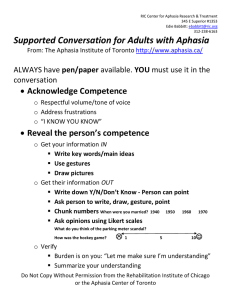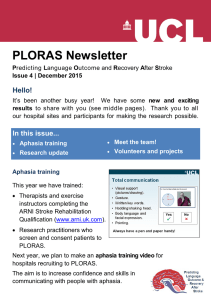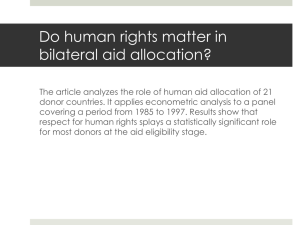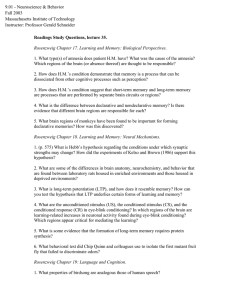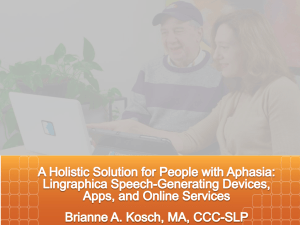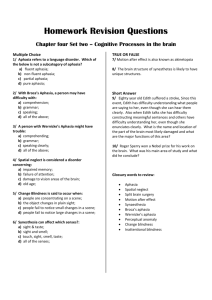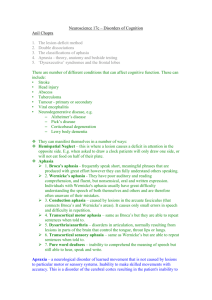CONNECTing in the Community Project Brief (DOC 152 KB).
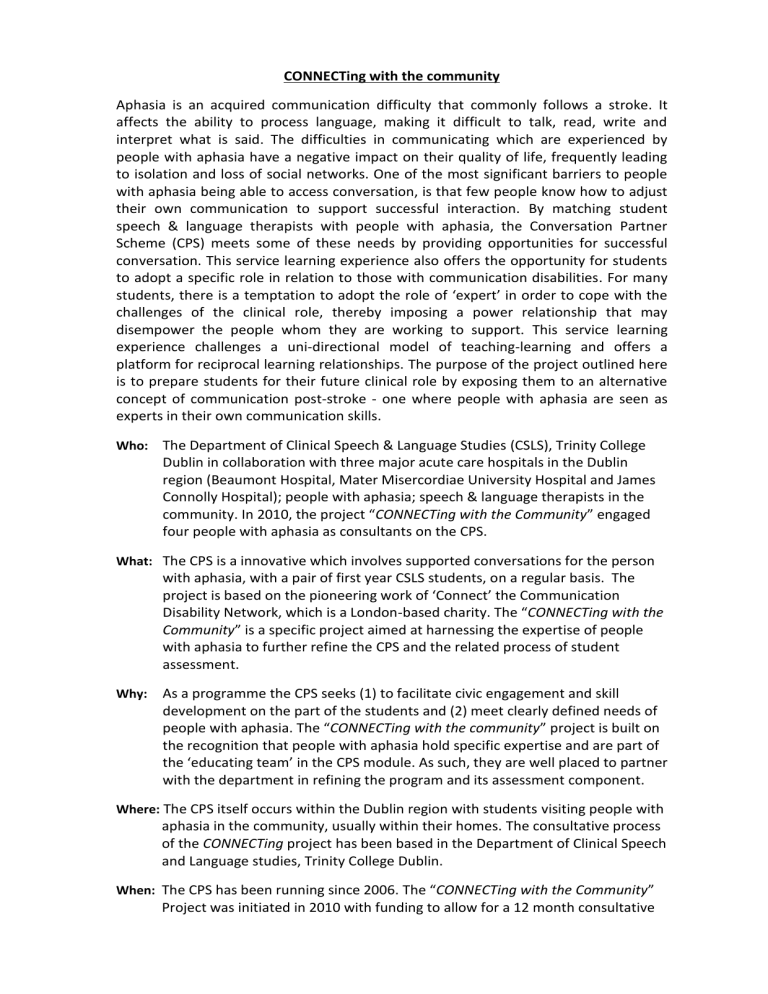
CONNECTing with the community
Aphasia is an acquired communication difficulty that commonly follows a stroke. It affects the ability to process language, making it difficult to talk, read, write and interpret what is said. The difficulties in communicating which are experienced by people with aphasia have a negative impact on their quality of life, frequently leading to isolation and loss of social networks. One of the most significant barriers to people with aphasia being able to access conversation, is that few people know how to adjust their own communication to support successful interaction. By matching student speech & language therapists with people with aphasia, the Conversation Partner
Scheme (CPS) meets some of these needs by providing opportunities for successful conversation. This service learning experience also offers the opportunity for students to adopt a specific role in relation to those with communication disabilities. For many students, there is a temptation to adopt the role of ‘expert’ in order to cope with the challenges of the clinical role, thereby imposing a power relationship that may disempower the people whom they are working to support. This service learning experience challenges a uni-directional model of teaching-learning and offers a platform for reciprocal learning relationships. The purpose of the project outlined here is to prepare students for their future clinical role by exposing them to an alternative concept of communication post-stroke - one where people with aphasia are seen as experts in their own communication skills.
Who: The Department of Clinical Speech & Language Studies (CSLS), Trinity College
Dublin in collaboration with three major acute care hospitals in the Dublin region (Beaumont Hospital, Mater Misercordiae University Hospital and James
Connolly Hospital); people with aphasia; speech & language therapists in the community. In 2010, the project “CONNECTing with the Community” engaged four people with aphasia as consultants on the CPS.
What: The CPS is a innovative which involves supported conversations for the person with aphasia, with a pair of first year CSLS students, on a regular basis. The project is based on the pioneering work of ‘Connect’ the Communication
Disability Network, which is a London-based charity. The “CONNECTing with the
Community” is a specific project aimed at harnessing the expertise of people with aphasia to further refine the CPS and the related process of student assessment.
Why: As a programme the CPS seeks (1) to facilitate civic engagement and skill development on the part of the students and (2) meet clearly defined needs of people with aphasia. The “CONNECTing with the community” project is built on the recognition that people with aphasia hold specific expertise and are part of the ‘educating team’ in the CPS module. As such, they are well placed to partner with the department in refining the program and its assessment component.
Where: The CPS itself occurs within the Dublin region with students visiting people with aphasia in the community, usually within their homes. The consultative process of the CONNECTing project has been based in the Department of Clinical Speech and Language studies, Trinity College Dublin.
When: The CPS has been running since 2006. The “CONNECTing with the Community”
Project was initiated in 2010 with funding to allow for a 12 month consultative
process between the Department of Clinical Speech & Language Studies, the
Consultants with Aphasia and the therapists forming part of the core CPS Team.
Project Description
In 2006, the Conversational Partner Scheme was introduced in Trinity as a pilot partnership between the Department of Clinical Speech and Language Studies, The
Mater Misercordiae University Hospital, Connolly Memorial Hospital and Beaumont
Hospital. In 2009 the programme was adopted as a credit-bearing module of the JF curriculum, called ‘Connect’. The project centres on facilitating people with aphasia to support students in developing effective conversation skills through weekly visits by paired sets of JF students to the homes of people with aphasia in the community.
Students are prepared for these visits through a workshop and training by people with aphasia. People with aphasia are supported to facilitate student learning and provide constructive feedback on students’ communication skills and what they might do to support conversation with another person with aphasia. The “CONNECTing with the
Community” project aimed to consolidate the notion of reciprocity in marrying the expertise of those with aphasia and the expertise of the university, in order to refine the partner scheme and the way in which students are assessed within this project.
Purpose
The objective of the project was to develop and evaluate an Articulated Learning (AL)
(Ash and Clayton, 2004) framework to support student reflection and assessment within the CPS module. Uniquely, the project works with people with aphasia and speech and language therapists as consultants in both developing and evaluating the
AL framework and documentation. The outcome has been the development and implementation of an explicit framework and support documentation to support student reflection and assessment. The documentation and framework is aphasiafriendly in language and style and has become a key resource for evaluating individual student learning. We foresee the materials being implemented to collate data on the module and its impact on students.
Taking on the role of expert can be a significantly empowering process for a person with aphasia. Given their experiences of communication successes and barriers to successful communication, they have a unique expertise in the condition and in how best to facilitate communication. Tapping this expertise has the potential to have a profound impact on the person themselves, in terms of their identity and experience of competence. In addition, their expertise can be used to shape service delivery and provide an ‘insider perspective’ which informs practice. This reciprocity has the potential to further the recognition of the expertise of those with aphasia, while at the same time enhancing the student learning experience by developing relevant and appropriate tools to support student reflection and assessment.
Results or Outcomes, Challenges, Lessons Learned
A reflective feedback framework has been developed, in consultation with people with aphasia engaged in the project. Together with a template to guide the reflection process, guidelines were developed to support the reflection process.
All materials are in an aphasia-friendly format.
As a result of discussion around the CPS and student learning, the program has been refined, incorporating a two week ‘rotation’ in which students are given the
opportunity to visit a second person with aphasia, through partnering with a different student in the class for one week. This valuable opportunity, to experience first hand that every person with aphasia is different, would not have arisen without the input from the consultants with aphasia.
The partnership between the CSLS department, the people with aphasia and the
SLTs was key to establishing the materials
Challenges: following through on some of the suggestions which emerged from the consultative process involved more logistical and administrative support than was initially envisaged
Lesson learned: (1) students need some support to access the process of Articulated
Learning and dedicated tutorials around the reflective process were helpful in this regard. It may be useful to introduce such supports earlier in the module.
(2) The administrative demand of the programme was under-estimated this year. It may be useful in future years to outline different administrative responsibilities within the team.
Resources Required to implement this type of project
Reciprocal relationships with community partners
Funding to secure consultancy from key stakeholders and run consultancy meetings
Administrative time to coordinate the programme: including the coordination of the referral and matching process, the inevitable changes and re-configuration of partnerships, the CONNECTing consultative meetings and the implications of adopting the “swop sessions”
Contact person
Caroline Jagoe: jagoec@tcd.ie
